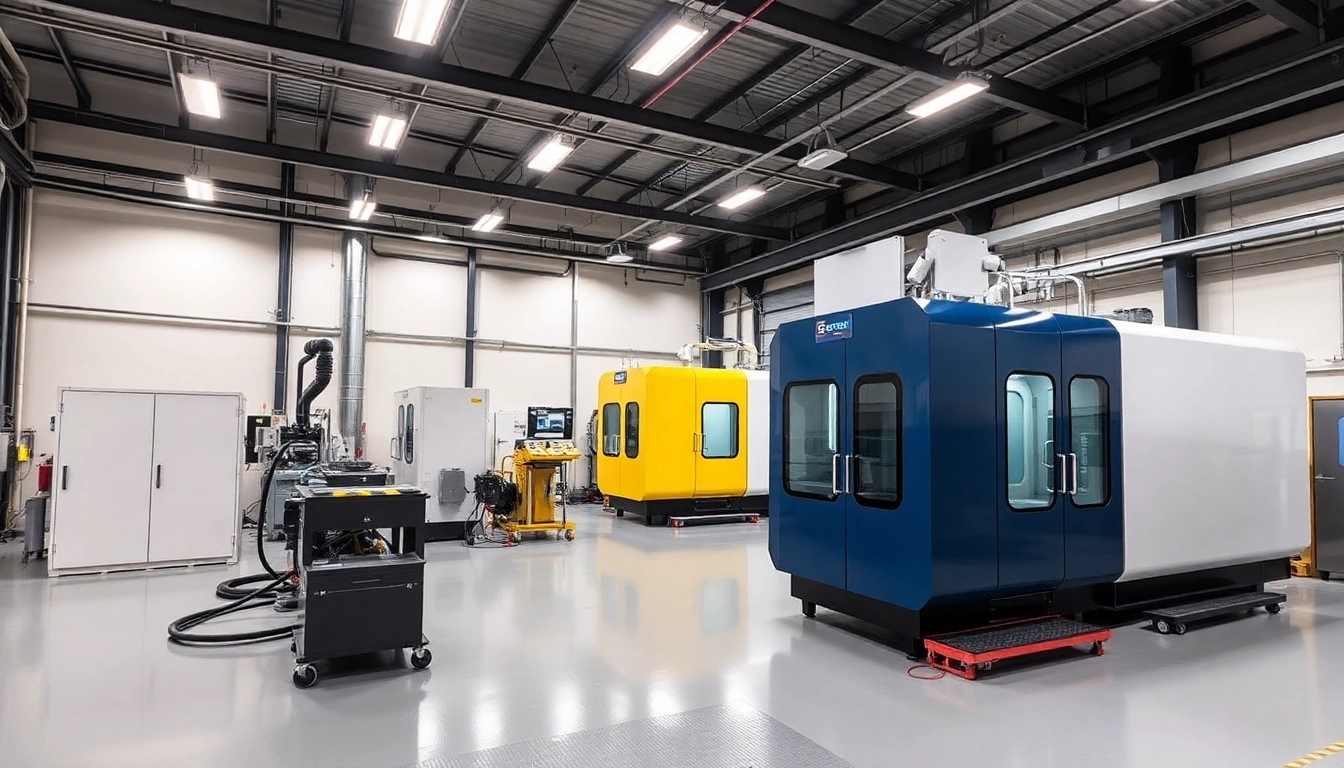Understanding the Role of Manhattan Construction Manager
The role of a Manhattan Construction Manager is a pivotal one in the construction industry, where varying stakeholders—from clients to subcontractors—expect seamless collaboration and effective management throughout the lifecycle of a project. As an integral part of project delivery, a Manhattan Construction Manager oversees not just the construction itself but also the intricate planning phases, ensuring that the vision aligns with reality.
Key Responsibilities of a Manhattan Construction Manager
A Manhattan Construction Manager carries a diverse workload that demands multitasking and effective prioritization. Key responsibilities typically include:
- Project Planning and Scheduling: Developing comprehensive project timelines, allocating resources efficiently, and establishing milestones to guide the project from inception to completion.
- Budget Management: Creating and maintaining financial plans to adhere to budgets, managing costs, and ensuring that the project remains financially viable throughout its phases.
- Compliance Oversight: Ensuring that all aspects of construction comply with local regulations, safety standards, and building codes.
- Communication Facilitation: Serving as the central point of contact for all stakeholders, effectively communicating progress updates and addressing any concerns promptly.
- Team Management: Leading a diverse team of professionals, including architects, engineers, and skilled labor, promoting collaboration to achieve shared goals.
Necessary Skills for Success
Success as a Manhattan Construction Manager hinges on a combination of technical knowledge, managerial ability, and interpersonal skills. Key skills include:
- Technical Knowledge: A solid understanding of construction methodologies, materials, and regulations is essential. This ensures the manager can make informed decisions throughout the project lifecycle.
- Leadership: The ability to inspire and lead teams effectively is crucial, particularly in motivating team members to meet project objectives.
- Time Management: Excellent organizational skills help prioritize tasks and allocate time efficiently to prevent delays.
- Negotiation Skills: The capacity to negotiate contracts and resolve conflicts is paramount, ensuring that both the contractor’s and clients’ needs are met.
- Problem-Solving Ability: The construction environment is often unpredictable; thus, the capability to identify issues and devise effective solutions is vital.
Industry Standards and Best Practices
To maintain high-quality outcomes, it is imperative that Manhattan Construction Managers adhere to industry standards and implement best practices. This includes:
- Adopting Technology: Utilizing modern project management tools and software to streamline processes and improve communication.
- Continuous Training: Engaging in ongoing education and professional development opportunities to stay abreast of emerging industry trends and technologies.
- Fostering Accountability: Establishing a culture of accountability where every team member understands their responsibilities and the importance of meeting deadlines and quality standards.
- Environmental Responsibility: Ensuring that projects adhere to sustainable practices and regulations, minimizing environmental impact and promoting energy efficiency.
Challenges Faced by a Manhattan Construction Manager
The role of a Manhattan Construction Manager is fraught with challenges that require strategic thinking and exceptional management skills. Common challenges include:
Managing Project Timelines and Budgets
One of the most significant challenges facing a Manhattan Construction Manager is balancing project timelines with budget constraints. Delays in construction can lead to increased costs, which may arise from unexpected complications, such as supply chain disruptions or weather-related issues. Effective strategies to manage these challenges include:
- Establishing Realistic Timelines: Before beginning construction, a thorough assessment of project scope, resource availability, and external factors can help set achievable deadlines.
- Regular Progress Monitoring: Implementing weekly or bi-weekly status meetings can ensure that any delays are identified early and corrective actions are taken swiftly.
- Flexible Budgeting: Including contingency funds in the budget can alleviate financial pressures caused by unforeseen expenses, providing greater flexibility in project management.
Communication and Coordination Challenges
Effective communication is crucial in a construction environment, where numerous parties must collaborate seamlessly. Challenges can arise from:
- Varying Communication Styles: Different stakeholders may have preferred communication methods, which can lead to misunderstandings. Establishing clear communication protocols can mitigate this issue.
- Information Overload: With multiple facets of a project underway, it can be challenging to sift through varying information sources. Utilizing centralized project management software can streamline information sharing and access.
- Time Zone Differences: In larger projects involving remote teams, differences in time zones can delay decision-making. Scheduling regular check-ins and utilizing collaborative decision-making tools can keep everyone aligned.
Ensuring Safety and Compliance
Maintaining safety standards and compliance with regulatory requirements is an ongoing challenge for construction managers. Strategies for addressing these concerns effectively include:
- Regular Safety Training: Implementing recurring safety training sessions helps reinforce safety protocols and keeps the workforce informed about best practices.
- Safety Audits: Conducting regular safety audits ensures that compliance measures are being strictly adhered to, identifying potential risks before they escalate.
- Documentation: Maintaining accurate records of compliance and safety training sessions is crucial for demonstrating adherence to regulations during inspections.
Building a Strong Team under a Manhattan Construction Manager
A successful project revolves around a well-functioning team. The responsibilities of a Manhattan Construction Manager include not only managing but also building and developing the team effectively. Key strategies to consider are:
Recruiting and Selecting Qualified Personnel
Finding the right individuals to form a robust construction team is a foundational step towards project success. Strategies for effective recruitment include:
- Clear Job Descriptions: Providing detailed descriptions of job roles allows candidates to self-assess their fit for the position, ensuring that only qualified individuals apply.
- Utilizing Comprehensive Interview Processes: Structured interviews that assess both technical skills and cultural fit are essential in selecting candidates who will contribute positively to the project environment.
- Verifying Qualifications: Conducting thorough background checks and reference evaluations helps ensure that candidates have the necessary skills and an appropriate understanding of industry standards.
Fostering Team Collaboration and Morale
Creating an environment of collaboration and high morale is fundamental to achieving project aims. Important strategies involve:
- Team-Building Activities: Organizational events that promote bonding can help foster relationships among team members, enhancing trust and collaboration.
- Encouraging Open Communication: Establishing an open-door policy can provide team members with the confidence to share ideas and express concerns, improving team dynamics.
- Recognizing Achievements: Acknowledging and rewarding team accomplishments can motivate individuals and uphold morale, encouraging continued effort toward collective goals.
Defining Roles and Responsibilities Clearly
Clearly defined roles and responsibilities help eliminate ambiguity within the team, ensuring everyone knows their tasks. Strategies to achieve clarity include:
- Detailed Task Assignments: Distributing written assignments that outline individual responsibilities can help team members stay focused and accountable.
- Regular Check-ins: Engaging in routine updates allows team members to understand their contributions’ relevance and enhances accountability.
- Creating a RACI Matrix: Developing a Responsibility Assignment Matrix (RACI) clarifies who Responsible, Accountable, Consulted, and Informed is for each task, enhancing team collaboration.
Technology and Tools for the Modern Manhattan Construction Manager
The construction industry has rapidly evolved, with technology playing a vital role in modern project management. A Manhattan Construction Manager can leverage these advancements to improve efficiency and decision-making. Key areas of focus include:
Project Management Software and Applications
Utilizing specialized project management software can significantly enhance organizational effectiveness. Essential features to look for include:
- Real-time Collaboration: Tools that support simultaneous updates allow teams to collaborate no matter where members are located, thus ensuring everyone is on the same page.
- Budget Tracking: Software with comprehensive financial tracking capabilities helps ensure projects remain within budget, enabling proactive decision-making regarding expenditures.
- Document Management: Effective project management software allows for easy storage, sharing, and revision tracking of essential project documents.
Leveraging BIM and Virtual Construction
Building Information Modeling (BIM) has revolutionized the way construction projects are planned and executed. By integrating BIM, a Manhattan Construction Manager can:
- Enhance Visualization: BIM allows for 3D modeling of projects, enabling stakeholders to visualize the finished product long before construction begins.
- Improve Coordination: With BIM, different disciplines can work off a single model, reducing clashes and miscommunication in project implementation.
- Streamline Change Management: When changes occur, BIM facilitates the quick incorporation of modifications across all project documents and timelines.
Using Data Analytics for Decision Making
Data analytics can aid in making informed decisions throughout the construction process. Effective use of data can include:
- Predictive Analytics: By analyzing historical project data, managers can forecast future project performance, identifying potential issues before they arise.
- Enhancing Efficiency: Data analytics helps identify inefficiencies in workflows and resource use, providing actionable insights to optimize operations.
- Risk Management: Assessing data helps identify possible risks related to timelines, costs, or safety, enabling construction managers to devise proactive strategies.
Measuring Success as a Manhattan Construction Manager
Success in construction management is quantifiable, allowing managers to assess their effectiveness and improve operations continuously. Key metrics and strategies include:
Performance Metrics to Consider
Concrete metrics allow a Manhattan Construction Manager to evaluate project success, including:
- On-time Delivery Rates: Tracking the percentage of projects delivered on time is crucial for assessing efficiency and planning accuracy.
- Budget Variance: Monitoring differences between projected and actual costs provides insight into financial control and resource management.
- Quality Metrics: Evaluating the number of defects or rework needed post-construction is essential in ensuring quality construction and identifying areas for improvement.
Client Satisfaction and Feedback Management
Client feedback is invaluable for assessing overall project success. Key methods for gathering insights include:
- Surveys and Questionnaires: Distributing post-project surveys can yield valuable insight into client satisfaction levels and provide manageable data for future improvements.
- Regular Updates: Maintaining open communication with clients throughout the project can help gauge satisfaction and address any concerns proactively.
- Post-Project Reviews: Conducting thorough reviews after completing projects allows for detailed feedback from clients, highlighting areas of excellence and opportunities for improvement.
Continuous Improvement Strategies
To foster ongoing development within a construction management framework, strategies may include:
- Regular Training Programs: Ensuring that team members stay current with best practices through training sessions enhances overall project efficiency and innovation.
- Feedback Loops: Establishing a feedback system where team members can share input on processes fosters a culture of continuous growth.
- Benchmarking Against Industry Standards: Continuously comparing project outcomes against industry standards can inform necessary adjustments and help identify successful practices.



